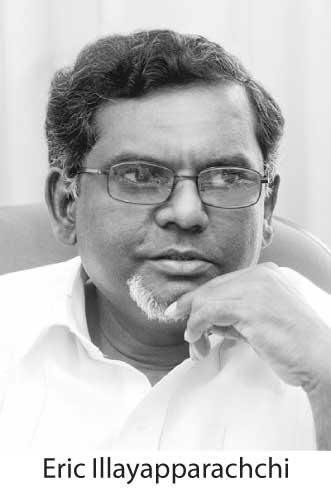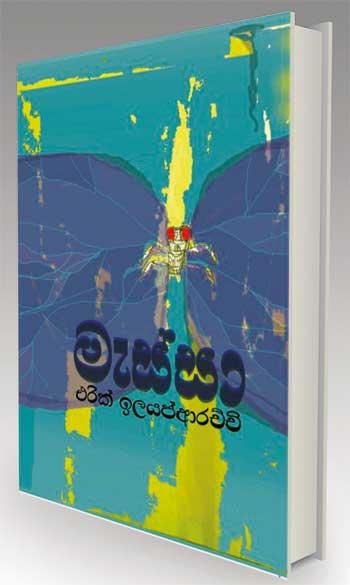Reply To:
Name - Reply Comment
Eric Illayaparachchi’s most recent literary creation, the novel Messa is a profound work that needs the attention of a larger audience than it has gained so far. Eric Illayaparachchi has an extensive ability to distinguish untouched mindsets with a reasonable expression to the human soul. This story is also led by so-called justifications and condemnations of human anomalies, as it prolongs the discussion towards a rather comprehensive call to society.
extensive ability to distinguish untouched mindsets with a reasonable expression to the human soul. This story is also led by so-called justifications and condemnations of human anomalies, as it prolongs the discussion towards a rather comprehensive call to society.
‘Messa’ is highly readable, and makes one assume that Eric has avoided the advanced storytelling method which he used in his previous books, as he adds a novelty to the story-line rather than working within its complexities and tries to make the complex appear quite simple.
Although the book reminds one of Maxim Gorki’s (1868-1936) trilogy; ‘My Childhood’, ‘In the World’ and ‘My Universities’, Eric attempts to unify these three together and accumulate a social-political weight hiding it behind the academia. And one could also say this is a parallel touch to the novel by the Irish novelist James Joyce (1882-1941), “A Portrait of the Artist as a Young Man” (1916).
The Art Work
 ‘Messa’ is written from a first-person perspective, and tries to build meaning within the structure of the work. Every phase of the story begins with a climax and ends with a denouement, but does not bring a sound solution for the characters in any way. ‘Messa’ can be distinguished as a question, rather than a resolution. Other than that, the writer’s exquisite competency of forming the story, controlling the main character and rendering an intrinsic value to the plot should be admired.
‘Messa’ is written from a first-person perspective, and tries to build meaning within the structure of the work. Every phase of the story begins with a climax and ends with a denouement, but does not bring a sound solution for the characters in any way. ‘Messa’ can be distinguished as a question, rather than a resolution. Other than that, the writer’s exquisite competency of forming the story, controlling the main character and rendering an intrinsic value to the plot should be admired.
"The story moves around one person, his experiences, people and books. The sarcasm in which the writer distinguishes to be within the neutral society and the deceitful cynicism addresses the common man remarkably"
The story moves around one person, his experiences, people and books. The sarcasm in which the writer distinguishes to be within the neutral society and the deceitful cynicism addresses the common man remarkably. Though this does not come as a surprise, the presence here of the most common feature of Eric’s work, the anxious, nostalgia with an introspective inwardness to the conscious and unconscious urges recalls the present-day cry for the existence of the Sapiens’ kind.
This narration promotes the writer’s viewpoint through the main character. There are certain instances that the featuring of the main character is pressed by the persuasiveness of the writer. However, this intervention is needed to address a broader discussion since it empowers the meaning of the novel. ‘Messa’ is an advanced negotiation between the intellectual and emotional dimensions of the person. The intellect is being played to solicit psycho-social satisfaction along with the emotional recognition of one’s existence.
Philosophical discussion
‘Messa’ is a lovable philosophical debate. This is the medium by which the writer denotes his love for philosophy. The narrator’s insecurities are deeply analyzed within a philosophical framework. The reader is pulled into an existential vacuum where an investigation is happening on the purpose of life. As the internal conflict moves with the being and non-being of the narrator, a reasonable justification for his situation is provided with daily interruptions in life.
This heroic character features a number of precognition, i.e. the history, the present and the future. The history describes the development of the person as the main character of the book, and the present emphasizes the moment with which the reader is affiliated. And the future, the anonymous. This anonymousness is derived from the major arguments that the writer adds to the story; changing mathematics into a philosophy degree, the critique on Simon-Sartre relationship, and Ceylon Flat Earthers Association. The rest of the incidents support the chief proposition of the deprivation in the mind and the matter, which best suits as a phenomenological analysis to understand the life conditions of the narrator.
The above mentioned three major attempts of the narrator are to find a meaning to life. The sarcasm behind these only enriches the narrator’s need for esteem rather than leading towards an actualized self. At the same time, the narrator’s actualization becomes a subjective and an external reality that is derived from the formed self-structure, the sense of the individual and the biological organism. To explain the above statement, the Simon-Sartre relationship is critiqued as forming a subjective reflection of the text. Ceylon Flat Earthers Association is the depraved mindset of the narrator that is seeking a paradigm shift. But the constant emergence of the mathematics-philosophy degree issue is detrimental to the flow of the story, limiting the vast scope that the narrator is achieving through reading.
Psychological Measurement
The first question one can ask about ‘Messa’ is ‘why memories?’ This story engages a deeper conversation on memories and diversity in relationships. Books, people and several incomplete incidents confer a satisfying pleasure to the reader’s mind. Starting from the narrator’s brother and sister, the order and the nurturing of the relationships bring solitary feelings, anxiety and a sense of incompleteness to the mind, yet a remarkable lining to the plot.
The derivation of the narrative character that comes to Colombo with a broken windscreen explicates the non-being. ‘Messa’ is aloud nostalgic reinforcement that provokes the problem of existence. Every sign or symbol the writer uses is to distinguish the absurdity and the adherent sickness or the disorderliness of the narrator. The more the narrator becomes intelligent, the more he pulls out the realities. A metamorphosis is needed for the narrator to absolve the dignity as an intellectual.
Also, the unsatisfied, narcissistic psycho-sexual deprivations and the deviant mentalities are well accounted for in the story. Each person’s whiteness is marked with a contemptible grey line, which reminds the reader of ‘Dorian Grey’. The wickedness has become a monument that burns the intrinsic values constructed by the external forces of the person. That is why a phrase from Rig Veda has been the prelude to the story.
Failure of the Academia
From the early days in school, till the suspensions of the university, the narrator was not the best nor the stupidest, but as a child till adulthood, the seriousness of the plot brings a re- soluble question to the reader, asking them ‘What was the issue? Where it began?’ To a psychologist, it would be the hyperactive disorder that existed in the child and to a philosopher; it could be this existential crisis, where the narrator desperately wishes to figure out the purpose of being the ‘being’.
soluble question to the reader, asking them ‘What was the issue? Where it began?’ To a psychologist, it would be the hyperactive disorder that existed in the child and to a philosopher; it could be this existential crisis, where the narrator desperately wishes to figure out the purpose of being the ‘being’.
Apart from the previous work, ‘Messa’ can be counted as a representation of the writer’s viewpoint to the existing academia. The inability to provide a greater extension of the knowledge, and inquiring about the provision of real meaning to the process of knowledge production, the failure of the humanities and the social sciences seem to be the current disappointments that the writer is experiencing.
"‘Messa’ is a lovable philosophical debate. This is the medium by which the writer denotes his love for philosophy. The narrator’s insecurities are deeply analyzed within a philosophical framework. The reader is pulled into an existential vacuum where an investigation is happening on the purpose of life"
Therewith, the writer questions the inadequacy of academia to establish assertive viability to promote academic discussion. The narrator is the mode which he uses to question the university education, and the writer starts paving the way from the first chapter of the book. The culmination of the writer’s assaying is the days within the university where the narrator plays the role of the silent hero, fighting the ragging, changing the stream of engineering to Philosophy, and most importantly sarcastically obtruding student activities. The Ceylon Flat Earthers Association is the most significant incident included that defines the inauthentic accession and the arbitrary ideological persuasion within the education system.
Above all, the writer believes in the practical necessity of proper academia rather than moaning about inabilities and insecurities. This is not another discussion that preaches morals or virtues. But it is mediating between the two major propositions of the era; why good academia is needed and how should it be made? ‘Messa’ is the shadowy wail of the academic failure of the previous generations, the inability to establish elite cultural propaganda within the education system, which the writer sees as the incapacity of the political moments to contribute to a progressive development within the education.
Concluding remarks
Messa’s inability to harness surrounding figures to produce a greater intellectual discussion is a sign of the failure within Sri Lankan society. The narrator’s ambition of generating a standard understanding of worldly phenomena has been just a dream. This abolishes the narrator from the existing context. The book does not let us explain or critique the story within our expectations. Yet, ‘Messa’ itself is a critique of everything that we follow within the story line. Hence, the writer requests the reader to unify all knowledge in a place where the world seems to gain a better appearance. It is not a false course or a weak induction to the present matters, but a flame of hope to build something stronger.